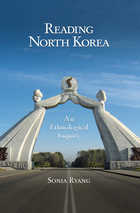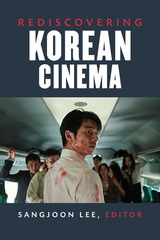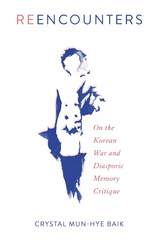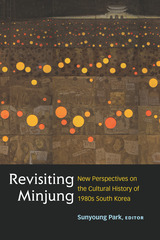8 start with R start with R

Often depicted as one of the world’s most strictly isolationist and relentlessly authoritarian regimes, North Korea has remained terra incognita to foreign researchers as a site for anthropological fieldwork. Given the difficulty of gaining access to the country and its people, is it possible to examine the cultural logic and social dynamics of the Democratic People’s Republic of Korea?
In this innovative book, Sonia Ryang casts new light onto the study of North Korean culture and society by reading literary texts as sources of ethnographic data. Analyzing and interpreting the rituals and language embodied in a range of literary works published in the 1970s and 1980s, Ryang focuses critical attention on three central themes—love, war, and self—that reflect the nearly complete overlap of the personal, social, and political realms in North Korean society. The ideology embedded in these propagandistic works laid the cultural foundation for the nation as a “perpetual ritual state,” where social structures and personal relations are suspended in tribute to Kim Il Sung, the political and spiritual leader who died in 1994 but lives eternally in the hearts of his people and still weaves the social fabric of present-day North Korea.

The contentious relationship between modernism and realism has powerfully influenced literary history throughout the twentieth century and into the present. In 1930s Korea, at a formative moment in these debates, a “crisis of representation” stemming from the loss of faith in language as a vehicle of meaningful reference to the world became a central concern of literary modernists as they operated under Japanese colonial rule.
Christopher P. Hanscom examines the critical and literary production of three prose authors central to 1930s literary circles—Pak T’aewon, Kim Yujong, and Yi T’aejun—whose works confront this crisis by critiquing the concept of transparent or “empiricist” language that formed the basis for both a nationalist literary movement and the legitimizing discourse of assimilatory colonization. Bridging literary and colonial studies, this re-reading of modernist fiction within the imperial context illuminates links between literary practice and colonial discourse and questions anew the relationship between aesthetics and politics.
The Real Modern challenges Eurocentric and nativist perspectives on the derivative particularity of non-Western literatures, opens global modernist studies to the similarities and differences of the colonial Korean case, and argues for decolonization of the ways in which non-Western literatures are read in both local and global contexts.

This groundbreaking collection of thirty-five essays by a wide range of academic specialists situates current scholarship on Korean cinema within the ongoing theoretical debates in contemporary global film studies. Chapters explore key films of Korean cinema, from Sweet Dream, Madame Freedom, The Housemaid, and The March of Fools to Oldboy, The Host, and Train to Busan, as well as major directors such as Shin Sang-ok, Kim Ki-young, Im Kwon-taek, Bong Joon-ho, Hong Sang-soo, Park Chan-wook, and Lee Chang-dong. While the chapters provide in-depth analyses of particular films, together they cohere into a detailed and multidimensional presentation of Korean cinema’s cumulative history and broader significance.
With its historical and critical scope, abundance of new research, and detailed discussion of important individual films, Rediscovering Korean Cinema is at once an accessible classroom text and a deeply informative compendium for scholars of Korean and East Asian studies, cinema and media studies, and communications. It will also be an essential resource for film industry professionals and anyone interested in international cinema.

In Reencounters,Crystal Mun-hye Baik examines what it means to live with and remember an ongoing war when its manifestations—hypervisible and deeply sensed—become everyday formations delinked from militarization. Contemplating beyond notions of inherited trauma and post memory, Baik offers the concept of reencounters to better track the Korean War’s illegible entanglements through an interdisciplinary archive of diasporic memory works that includes oral history projects, performances, and video installations rarely examined by Asian American studies scholars.
Baik shows how Korean refugee migrations are repackaged into celebrated immigration narratives, how transnational adoptees are reclaimed by the South Korean state as welcomed “returnees,” and how militarized colonial outposts such as Jeju Island are recalibrated into desirable tourist destinations. Baik argues that as the works by Korean and Korean/American artists depict this Cold War historiography, they also offer opportunities to remember otherwise the continuing war.
Ultimately, Reencounters wrestles with questions of the nature of war, racial and sexual violence, and neoliberal surveillance in the twenty-first century.


Revisiting Minjung brings new themes, new subjectivities, and new theoretical perspectives to the study of the rich ecosystem of 1980s Korean culture. Treated here is a wide array of topics, including the origins of minjung ideology, its critique by the right wing, minjung art and music, workers’ literary culture, women writers and the resurgence of feminism, erotic cinema, science fiction, transnational political travels, and the representations of race and queerness in 1980s popular culture. The book thus details the origins and development of some of the movements that shape cultural life in South Korea today, and it does so through analyses that engage some of the most pressing debates in current scholarship in Korea and abroad.


READERS
Browse our collection.
PUBLISHERS
See BiblioVault's publisher services.
STUDENT SERVICES
Files for college accessibility offices.
UChicago Accessibility Resources
home | accessibility | search | about | contact us
BiblioVault ® 2001 - 2024
The University of Chicago Press









